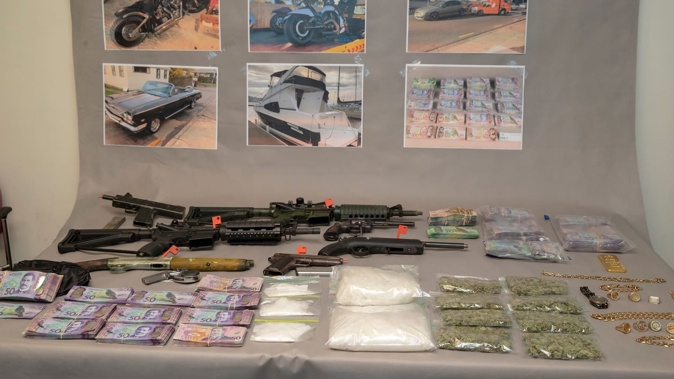

An undercover police officer netted a drug dealer by pretending to be a methamphetamine buyer who spent $60,000 on the Class A over six weeks.
Details of the dealing between Undercover Officer A and the King Cobra gang member, in which 182 grams of the drug were offered or exchanged, have been outlined in court documents filed by police confiscating the assets of the dealer’s boss.
A classic Chevrolet Impala convertible, Harley Davidson motorcycles, gold rings, a gold bracelet, a Louis Vuitton bag, and $36,000 in cash and bank deposits have now all been forfeited to the Crown.
The drug dealing dates back to 2019 but is still being dealt with in the courts as police take action to confiscate property under the Criminal Proceeds Recovery Act 2009 that was “tainted” by illegal activity.
In November last year, the High Court found that King Cobra gang member Tereva David Akavi, identified as the head of a Wellington meth supply syndicate, was liable to lose $98,850 of his assets, forfeited to the Crown.
But police believed he should have to hand over nearly five times as much - $468,000 - based on the amount of money they say he made in a year from the illegal drugs trade.
They made a successful bid to the Court of Appeal to increase the “maximum recoverable amount” to that level.
That Court of Appeal decision was released this month.
Drug-dealing earns $9000 a week
To get their result, police calculated how much Akavi had been making from meth dealing by looking at the amounts of the drug being sold to Undercover Officer A between February and April 2019.
The sales to the officer were made by one of Akavi’s two subordinates in the King Cobras who were working with him in the drugs trade.
Undercover Officer A’s purchases indicated that Akavi, “either directly or through his subordinates”, was selling a minimum of one ounce (28 grams) of methamphetamine a week, the Court of Appeal decision said.
With each ounce sold netting Akavi about $9000, his annual income would be $468,000 – the amount police said he should be liable for under the assets forfeiture legislation.
Police said it was reasonable to assume that Undercover Officer A was just one of many customers, so the unlawful benefit figure of $468,000 “should be considered as conservative”.
Police searched Akavi’s home and vehicles after arresting him, finding a “significant amount” of meth, cash and cannabis.
He later pleaded guilty to supplying meth, possessing meth for supply, offering to supply meth, possessing cannabis for supply, possessing firearms or ammunition and failing to assist police.
He was jailed when he appeared in the Hutt Valley District Court for sentencing in October 2021. His statutory release date was in June last year.
In applying for the forfeiture of Akavi’s assets, police said that his declared earnings were insufficient to allow him to accumulate the property they seized.
IRD data shows declared earnings ‘too low’
Inland Revenue data showed Akavi’s declared income for the tax years 2013 to 2018 was $86,411 in total.
He had no record of income in the year ended March 2014, and his declared gross income for 2018 was only $2044.
“The evidence obtained by the criminal investigation team has identified that [Akavi] has supplied a significant amount of methamphetamine and is dealing in significant amounts of cash,” police said.
“The level of legitimate income enjoyed by [Akavi] is simply too low to support such activities.”
Akavi did not attempt to oppose the court action in which police went after his assets.
The Court of Appeal decision made it clear that the nominal amount to be forfeited may exceed the property that had already been or could be taken.
“The shortfall is a debt to the Crown which may be enforced by the Official Assignee,” it said.
The Official Assignee is a government official who administers matters including asset seizures, bankruptcies and liquidations.
Shortly after Akavi was arrested, police announced they had wound up a months-long operation combating meth dealing in the Wellington area.
They said it targeted two syndicates dealing in the drug. More than 30 people were arrested.
Police later held a media conference where they displayed drugs, cash, jewellery and firearms they had seized, alongside photographs of vehicles and a boat.
Some of the jewellery and vehicles matched the descriptions of property seized from Akavi and detailed in the police’s proceeds of crime applications.
Ric Stevens spent many years working for the former New Zealand Press Association news agency, including as a political reporter at Parliament, before holding senior positions at various daily newspapers. He joined NZME’s Open Justice team in 2022 and is based in Hawke’s Bay. His writing in the crime and justice sphere is informed by four years of front-line experience as a probation officer.

Take your Radio, Podcasts and Music with you









